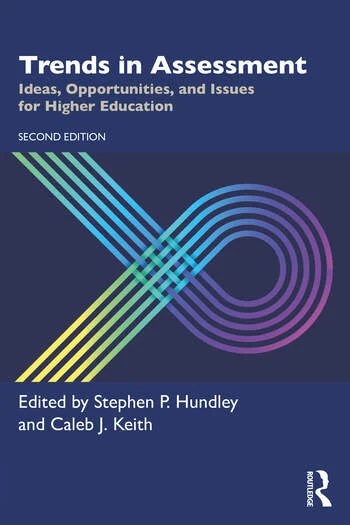Informed, in part, by sessions at the Assessment Institute in Indianapolis, the oldest and largest U.S. event focused on assessing and improving higher education, this second edition of Trends in Assessment is intended to encapsulate lessons learned from the recent past, reflect the current state, and inspire future directions for higher education assessment.
Throughout the volume, organizers of the Assessment Institute contribute chapters framed around some of the major topics, tracks, and themes from the annual program. Each chapter provides important background and context with attention to the significance of the topic, describes current and enduring trends, and offers ideas about emerging trends and their implications for higher education. Chapters conclude with a summary of the main trends and questions for consideration and discussion. The volume is also influenced by the work of key Assessment Institute national-level partners, along with the substantial bodies of literature on student learning and development, assessment and improvement, and higher education administration.
This book provides readers with information, strategies, and resources on assessment concepts and approaches across a broad and diverse mix of disciplines, institutional and organizational types, and levels of experience in higher education assessment. Designed to be incorporated into workshops, professional development programs, and courses, faculty and staff members, educational developers, student affairs practitioners, and graduate students of higher education administration will find the ideas and information presented in Trends in Assessment a useful resource on assessment and improvement in contemporary higher education.
We want to hear from you about Trends in Assessment:
- Provide reactions or suggestions about trends.
- Share and access resources related to trends.
- Learn about professional development opportunities related to trends.
Click here to send us feedback (reactions/suggestions) about trends.
Chapter-Specific Resources for Trends in Assessment: Ideas, Opportunities, and Issues for Higher Education (2nd Edition):
Chapter 01 – National Trends and Pandemic Expansions of Assessment Foundations
Chapter 02 – Applying a Diversity, Equity, Inclusion, and Justice (DEIJ) Lens to Assessment
Chapter 03 – When Done Well: A Primer on Where We Are and Where We Are Going in High-Impact Practices (HIPs)
Chapter 04 – How HIP Are You? Assessing the Impact of High-Impact Practices
Chapter 05 – Assessing Student Needs, Learning, and Impact Beyond the Classroom: Trends in Student Affairs and Cocurricular Assessment
Professional Organizations:
- Student Affairs Assessment Leaders –
Student Affairs Assessment Leaders (SAAL) provides the opportunity for educators that coordinate assessment for divisions of student affairs to discuss issues to improve their work. Our members lead assessment in divisions of student affairs at a variety of institutions across the U.S. The organization seeks to create an atmosphere where leaders can share and advance conversations related to creating division assessment infrastructure, supporting assessment projects, and documenting student learning as it relates to the academic mission.
- NASPA Student Affairs Administrators in Higher Education: Assessment, Evaluation, and Research Knowledge Community –
The NASPA Assessment, Evaluation, and Research Knowledge Community encourages and supports student affairs professionals as they assess learning, evaluate programs, and research theory and practice. By providing quality education and networking opportunities the KC strives to serve as a driving force in the movement towards improved student learning.
- ACPA College Student Educators International: Commission for Assessment and Evaluation –
The Commission for Assessment and Evaluation promotes assessment skills and knowledge to facilitate and support student learning, development, and effective student affairs practice.
Selected Publications:
- ACPA-College Student Educators International. (2006). ASK standards: Assessment skills and knowledge content standards for student affairs practitioners and scholars.
- Allworth, , D’Souza, L., Henning, G. W., & Morrison, J. (2021). Design thinking in student affairs: A primer. Stylus Publishing.
- Brown, G. (2020). Developing a co-curricular learning model (4th ed.). Roompact.
- Busby, K., & Aaron, R. W. (2021, April). Advances, contributions, obstacles, and opportunities in student affairs assessment (Occasional Paper No. 52). University of Illinois and Indiana University, National Institute for Learning Outcomes Assessment.
- Henning, G. W., & Roberts, D. (2016). Student affairs assessment: Theory to practice. Stylus Publishing.
- Montenegro, , & Jankowski, N. A. (2020, January). A new decade for assessment: Embedding equity into assessment praxis (Occasional Paper No. 42). University of Illinois and Indiana University, National Institute for Learning Outcomes Assessment.
- Yousey-Elsener, K., Bentrim, E. M., & Henning, G. W. (Eds.) (2015). Coordinating student affairs divisional assessment: A practical guide.Sterling, VA: Stylus Publishing.
Chapter 06 – Student Partnership and Engagement in Assessment
- More information is forthcoming.
Chapter 07 – Advancing STEM Education Through Quality, Equity, and Evidence
- More information is forthcoming.
Chapter 08 – The Evolving Impact of Authentic Assessment Practices in Graduate and Professional Education
The Council of Graduate Schools focuses on advancing graduate education and promotes research related to the graduate student experience. Key resources and reports related the chapter include:
Chapter 09 – Faculty Development: Moving Toward Equity
Chapter 10 – Achieving and Scaling Learning Improvement
- Introductory article on learning improvement: Fulcher, K. H., Good, M. R., Coleman, C. M., & Smith, K. L. (2014, December). A simple model for learning improvement: Weigh pig, feed pig, weigh pig. Occasional Paper #23. Champaign, IL: National Institute for Learning Outcomes Assessment:
- Book on learning improvement: Fulcher, K. H., & Prendergast, C. (2021). Improving student learning at scale: A how-to guide for higher education. Sterling, VA: Stylus Publishing.
- Dissertation on large scale learning improvement. Prendergast, C. (2022). Learning improvement at scale: Improving rhetorical awareness in a first-year writing program [Unpublished doctoral dissertation. James Madison University.
- Special Research Practice & Assessment Issue on Learning Improvement
- Learning Improvement Community: Stories about Learning Improvement
- James Madison University Program Creation & Mapping–Articulating Program Theory
Chapter 11 – Themes, Perspectives, and Meta-Trends in Assessment



